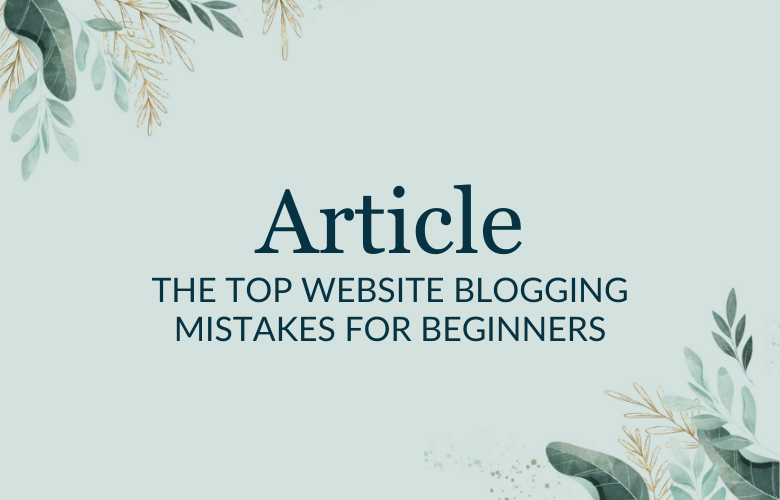
The Top Website Blogging Mistakes For Beginners
One of the best ways to grow your online presence is to start a blog. Content marketing has become more effective in recent years, so more and more personalities and businesses are writing blogs and promoting them. The service includes blogging on their own site as well as conducting blogger outreach and writing guest posts. In addition to increasing organic traffic, your blog can also help you gain trust and authority in your industry. However, there are some common blogging mistakes for beginners that you can make that could harm your position in the industry. This post will present a list of the most common blogging mistakes beginners make so that they can be avoided.
Blogging Mistakes For Beginners
1. Not defining a target audience
One of the biggest blogging mistakes bloggers make is to blog without specifying a target audience. Getting your offerings in front of specific groups of people will ensure that they are most likely to be interested in your products and services. For instance, an infant food brand would target new parents. Therefore, whenever a new parent comes across your product online and is interested in learning more about your brand, they will find articles on various topics they might find useful, such as child nutrition, parenting tips, etc. This will make them more likely to relate to your brand.
Imagine organizing a blog without keeping your target audience in mind for the same brand. Could your posts relate to people and make them interested in your post? No, not really. You must first define your target audience before you begin blogging; otherwise, your content will not resonate with your readers. It is important to optimize your content according to buyer personas if your brand attracts a wide range of customers. An ideal buyer persona can be created by analyzing current customer data. You can have a single buyer persona or multiple buyer personas, depending on your business.
Once these personas are defined, you can focus on developing content that appeals to them specifically. By using buyer personas to create blog content, you’ll be able to generate more sales and profit than general content. You can also get more leads for your business, improve lead nurturing, and build a loyal customer base.
2. Inconsistent blogging
It is never a good idea to pause content creation if your blog drives a substantial amount of traffic to your site. Fresh content on your blog is a major reason people return to your site often. It can put your site traffic into a downward spiral if you stop doing that – a common mistake among beginner bloggers. A content calendar is, therefore, a necessity for every business blogger. By planning your blog content for the upcoming weeks or days, you avoid discovering new content every time you create a blog post.
When you don’t have much time to devote to content planning, a content calendar can be your best friend. A few posts can be scheduled for a week, allowing you to shift your focus to other aspects of your business during that time. Plan your content for your blog to keep it updated and enable your blog to be indexed by search engines. By doing so, your content can rank well and strengthen your authority in the niche.
3. Overemphasizing SEO
Your content must be optimized for search engines to improve its online visibility. However, if you place SEO over the user’s experience, you may wind up writing subpar content. Conducting keyword research is the first step in writing SEO content. Your content’s online visibility will be enhanced by adding terms and phrases relevant to your content.
As a beginner blogger, you should do keyword research not just for SEO but also to figure out what your target audience is searching for online. By doing this, you can create blog posts that address the issues your readers face. Google has made recent algorithm updates in which the search engine now places a greater emphasis on the context of the content than on its SEO value. As a result, if you want to create content that is read and valued widely, focus on carefully researching and writing high-quality content first.
4. Diverging from the target niche
Trying to write a new blog post can make it easy to deviate from your niche market. Most beginner bloggers commit this mistake. To appeal to a mass audience, they tend to cover a wide range of topics. You never know what your audience will like if you appeal to a broad audience. Bloggers should choose a niche to blog about, regardless of whether they are individuals or businesses. You can reach your target audience this way. Targeting the right audience increases blog traffic and engagement. It is also easier to establish yourself as a blogger if you write about a certain niche.
5. Publish short content frequently
A successful blog is based on consistency, as we discussed earlier. There is no need to publish new blog posts every day to be consistent. Consider running a baking business online. Baking, flavoring, icing, and cake decorations are all-natural topics for your blog. Suppose you decide to write about fresh fruit cakes, explain how to make the cake, decorate it, and what ingredients you need. You then write five to seven short blog posts about different steps of the baking process every day.
However, it would be more valuable for you to compile your short posts into a comprehensive article covering all aspects of fresh fruit cakes. Your content will be more valuable, and you’ll spend less time writing one blog. Hence, all bloggers are advised to write the content of 2,000 or more words to answer as many questions on a given topic as possible rather than 1,000 or fewer words each day. Here are the reasons your blog should move from your Instagram account to a website!




